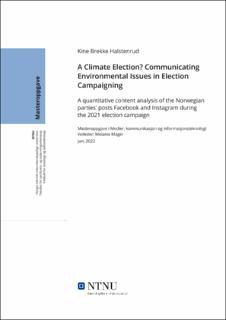| dc.contributor.advisor | Magin, Melanie | |
| dc.contributor.author | Halstenrud, Kine Brekke | |
| dc.date.accessioned | 2022-09-16T17:19:53Z | |
| dc.date.available | 2022-09-16T17:19:53Z | |
| dc.date.issued | 2022 | |
| dc.identifier | no.ntnu:inspera:104662308:65087453 | |
| dc.identifier.uri | https://hdl.handle.net/11250/3018585 | |
| dc.description.abstract | Klimaendringer omtales som vår tids største utfordring, og det kreves stadig mer av politikerne for å redde kloden. Med stadig flere publiseringer av nye rapporter som roper «kode rød» for menneskeheten, ble Norges stortingsvalg 2021 mye omtalt som et klimavalg. Da de miljøfokuserte partiene ikke kom i regjering sådde dette derimot tvil hos mange om valget faktisk endte som nettopp et klimavalg. Denne masteroppgaven studerer de ti stortingspartienes kommunikasjon om miljø- og energipolitikk på Facebook og Instagram under den norske valgkampen i 2021. Gjennom en kvantitativ innholdsanalyse av partiene og deres partilederes poster på sosiale medier, undersøkes partienes deltakelse i kommunikasjon om miljø- og energipolitikk og utformingen av deres miljørelaterte budskap. Teoretiske konsepter innen strategisk politisk kommunikasjon på sosiale medier, samt kommunikasjon og visualisering av klima legger et godt rammeverk for å avdekke politikernes strategier på sosiale medier. Analysen viser at partier som har miljø som hovedfokus engasjerer seg mest i slik kommunikasjon på sine sosiale medier. Likevel er ikke partiene like tydelige i sin kommunikasjon om hvilke tiltak de ønsker å innføre. Samtidig viser resultatene at politikerne er forsiktige med å fremstille klimasaken som et skremmende og alvorlig problem, og noe som potensielle stemmegivere må ta ansvar for. Disse resultatene er et viktig tilskudd til et forskningsfelt som i stor grad har fokusert på tradisjonelle medier samt andre klimainteressenter enn politikere. | |
| dc.description.abstract | Climate change is discussed as the greatest challenge of our time, and it is progressively more required of politicians take action to save the planet. With the increasing number of publications of new reports warning of a “code red” for humanity, Norway’s 2021 election were widely referred to as a climate election. When the environmentally focused parties did not make it into the government, there was doubt that it the election in fact was a climate election. This master’s thesis studies the ten parliament parties’ communication on environmental and energy policy on Facebook and Instagram during the 2021 Norwegian election campaign. Through a quantitative content analysis of the parties and their top candidates’ posts on social media, the parties’ engaging in communication on environmental issues are investigated. Theoretical concepts in strategic political communication on social media, as well as communication and visualization of climate, provide a good framework for uncovering politicians' strategies on social media. The analysis shows that the parties whose main focus is environmental policy are also most involved communication about the topic on their social media platforms. However, the parties are not as clear in their communication about what actions they want to introduce to solve the problem. In addition, the results show that politicians are cautious about presenting climate change as frightening and serious problem, and something that voters must take responsibility for. The results of the analysis are important contributions to a field of research that is largely focused on traditional media as well as climate stakeholders other than politicians. | |
| dc.language | eng | |
| dc.publisher | NTNU | |
| dc.title | A Climate Election? Communicating Environmental Issues in Election Campaigning | |
| dc.type | Master thesis | |
